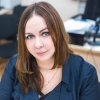What is the role of postgraduate study today and how does it differ from other levels of education?
Postgraduate studies give students an opportunity to embrace scientific creativity. This is when you can refine your ideas, implement a unique project, and try your hand at teaching. There are huge opportunities for personal development and naturally, this is all accompanied by constant support from scientific supervisors, departments and international research laboratories university administration and our office in particular.
The PhD program differs to earlier levels of education in that, the bachelors degree offers a general foundation and specialized practical training sufficient for performing certain professional tasks, the Masters is aimed at specific knowledge and skills and conducting independent research work, which gears you up for admission into postgraduate studies.
One of the tasks of the above mentioned office is to keep postgraduate students and young researchers and scientists abreast of information regarding contests, scholarships or grants, as well as to help prepare the relevant documents. An example of that is Evgeny Chyorny and Alyona Shchelokova gaining the President of Russian Federation’s prestigious scholarship.

A PhD is without a doubt for those who want to become leading professionals in their field, who want to participate and supervise foundational and applied projects, implement R & D in high tech business, education, and society as a whole. Besides this, having attained your PhD is considered prestigious and plays a significant role in your career in both business and academic sectors.
How up-to-date is ITMO University’s postgraduate program in responding to the emergence of new scientific fields or specialities?
The University is very flexible and responds quickly to new trends in scientific fields. In 2015 we started two new disciplines - “Systems, Networks and Telecommunication devices” and “Physics of Condensed Matter”, and in 2016 due to the growing demand of research in the field of Radiophysics and Quantum Electronics, we opened admissions for a new discipline “radiophysics” at the initiative of the director of the International Scientific Research Center for nanophotonics and metamaterials, Pavel Belov. We continue to research the needs of the market and are ready to follow modern trends.
We also support international academic mobility of postgraduate students: we now have twenty joint educational programs with leading foreign universities. Twice a year there is a contest for individual funding to support the most able young scientists and direct them to internships in one of the partner universities. We believe that actively stimulating scientific activities is of equal importance. Traditionally those who at the time of admissions are able to show that they have outstanding scientific achievements will receive a larger scholarship from the first semester. Special bonuses are provided for publication activity and research work.

What work is being done to attract students to the PhD program?
This is one of our key tasks, which we work on continuously for the whole year. Traditionally we organized Open Days, separately for local and for foreign students, and we also hold special information sessions for graduates.
Very different applicants apply to the program, starting from those who want to try out science and have just started out in the field, to those who are already established researchers. We noticed that in recent years there are quite a number of applicants with a very impressive research portfolio, publications in major scientific journals and extensive experience in public speaking. They are often very active and ambitious throughout the admissions process into the PhD program at ITMO University, they are not only willing to participate in the projects of the University, but also show outstanding results in extra-academic activities. Representatives from amongst the postgraduates participate in major exhibitions and conferences such as Geek Picnic, See Congress, Laser Optics, “From Science to Business”
Of course, in a non-classical university, the postgraduate program is also non-classical. We try to communicate with postgrads in the same language, we have a group on “VKontakte” and actively use other social and professional networks.

How has the PhD admission process evolved ?
First of all, I want to note that this was the second year we used online application forms and in my opinion it was more than successful. In 2015 we ran more than 60 online examinations and in the end of the current admission process we have over 90. And more than 10 exams were taken in English. Applicants came from countries around the world, such as U.S.A, china, Italy, Iran, Algeria, Libya, and Myanmar. Of course we are planning to develop distance/online technology and further. Each year in this format, we had not only examination tests, but also written exams with a full interview with the admissions committee.
The office helps students get through the sometimes overwhelming amount of documents to help make the process smoother and easier.



